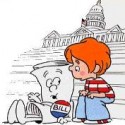 My article for CNET News.com this morning analyzes the “leaked” net neutrality bill from Rep. Henry Waxman, chair of the House Energy and Commerce Committee. I put leaked in quotes because so many sources came up with this document yesterday that its escape from the secrecy of the legislative process hardly seems dramatic. Reporters with sources inside Waxman’s office, including The Hill and The Washington Post, expect Waxman to introduce the bill sometime this week.
My article for CNET News.com this morning analyzes the “leaked” net neutrality bill from Rep. Henry Waxman, chair of the House Energy and Commerce Committee. I put leaked in quotes because so many sources came up with this document yesterday that its escape from the secrecy of the legislative process hardly seems dramatic. Reporters with sources inside Waxman’s office, including The Hill and The Washington Post, expect Waxman to introduce the bill sometime this week.
The CNET article goes through the bill in some detail, and I won’t duplicate the analysis here. It is a relatively short piece of legislation that makes limited changes to Title I of the Communications Act, giving the FCC only the authority it needs to implement “core” regulations that would allow the agency to enforce violations of the open Internet principles. Continue reading →

My article for CNET this morning, “The end of software ownership…and why to smile,” looks at the important decision a few weeks ago in the Ninth Circuit copyright case, Vernor v. Autodesk. (See also excellent blog posts on Eric Goldman’s blog. Unfortunately these posts didn’t run until after I’d finished the CNET piece.)
The CNET article took the provocative position that Vernor signals the eventual (perhaps imminent) end to the brief history of users “owning” “copies” of software that they “buy,” replacing the regime of ownership with one of rental. And, perhaps more controversially still, I try to make the case that such a dramatic change is in fact not, as most commentators of the decision have concluded, a terrible loss for consumers but a liberating victory.
I’ll let the CNET article speak for itself. Here I want to make a somewhat different point about the case, which is that the “ownership” regime was always an aberration, the result of an unfortunate need to rely on media to distribute code (until the Internet) coupled with a very bad decision back in 1976 to extend copyright protection to software in the first place.
Continue reading →
 I don’t have a great deal to add to coverage of last week’s big patent story, which concerned the filing of a complaint by Microsoft co-founder Paul Allen against major technology companies including Apple, Google, Facebook and Yahoo. Diane Searcey of The Wall Street Journal, Tom Krazit at CNET News.com, and Mike Masnick on Techdirt pretty much lay out as much as is known so far.
I don’t have a great deal to add to coverage of last week’s big patent story, which concerned the filing of a complaint by Microsoft co-founder Paul Allen against major technology companies including Apple, Google, Facebook and Yahoo. Diane Searcey of The Wall Street Journal, Tom Krazit at CNET News.com, and Mike Masnick on Techdirt pretty much lay out as much as is known so far.
But given the notoriety of the case and the scope of its claims (the Journal, or at least its headline writer, has declared an all-out “patent war”), it seems like a good opportunity to dispel some common myths about the patent system and its discontents.
And then I want to offer one completely unfounded theory about what is really going on that no one yet has suggested. Which is: Paul Allen is out to become the greatest champion that patent reform will ever know.
Continue reading →
 Emotions ran high at this week’s Privacy Identity and Innovation conference in Seattle. They usually do when the topic of privacy and technology is raised, and to me that was the real take-away from the event.
Emotions ran high at this week’s Privacy Identity and Innovation conference in Seattle. They usually do when the topic of privacy and technology is raised, and to me that was the real take-away from the event.
As expected, the organizers did an excellent job providing attendees with provocative panels, presentations and keynotes talks—in particular an excellent presentation from my former UC Berkeley colleague Marc Davis, who has just joined Microsoft.
Continue reading →
The Progress and Freedom Foundation has just published a white paper I wrote for them titled “The Seven Deadly Sins of Title II Reclassification (NOI Remix).” This is an expanded and revised version of an earlier blog post that looks deeply into the FCC’s pending Notice of Inquiry regarding broadband Internet access. You can download a PDF here.
I point out that beyond the danger of subjecting broadband Internet to extensive new regulations under the so-called “Third Way” approach outlined by FCC Chairman Julius Genachowski, a number of other troubling features in the Notice indicate an even broader agenda for the agency with regard to the Internet. Continue reading →
The release of a joint policy framework from Google and Verizon this week touched off even more activity in the never-ending saga of Net Neutrality than the rumors about the possibility such an agreement was in the works did the week before.
Op-ed pages, business and technology news programs, and public radio’s precious moments were overrun with anxious talking heads denouncing or praising the latest developments, or even a few of us trying just to explain what was and was not actually being said and done.
That’s not how August is supposed to be in policyland, when Washington reverts to the swamp from which it came. (John Adams left early one summer during his Presidency and refused to return long after the heat had broken.) I had hoped at long last to get around to finalizing last year’s tax return or maybe fixing my perennially-broken irrigation system, but oh well. Continue reading →
 At ten A.M. Pacific this morning, CNET News.com asked if I could write an article unraveling the legal implications of a rumored deal between Google and Verizon on net neutrality. I didn’t see how I could analyze a deal whose terms (and indeed, whose existence) are unknown, but I thought it was a good opportunity to make note of several positive developments in the net neutrality war this summer.
At ten A.M. Pacific this morning, CNET News.com asked if I could write an article unraveling the legal implications of a rumored deal between Google and Verizon on net neutrality. I didn’t see how I could analyze a deal whose terms (and indeed, whose existence) are unknown, but I thought it was a good opportunity to make note of several positive developments in the net neutrality war this summer.
Just as I was finishing the piece a few hours later, another shocker came when the FCC announced it was concluding talks it had been holding since June with the major net neutrality stakeholders. It’s possible the leaked story about Google and Verizon, and the feverish response to it, whipped up by the straggling remnants of a coalition aimed at getting an extreme version of net neutrality into U.S. law by any means necessary, soured the agency on what appeared to be productive negotiations. Or maybe they’ve just gone as far as they can for now. Continue reading →
 I dashed off a piece for CNET today on the Copyright Office’s cell phone “jailbreaking” rulemaking earlier this week. Though there has already been extensive coverage (including solid pieces in The Washington Post, a New York Times editorial, CNET, and Techdirt), there were a few interesting aspects to the decision I thought were worth highlighting.
I dashed off a piece for CNET today on the Copyright Office’s cell phone “jailbreaking” rulemaking earlier this week. Though there has already been extensive coverage (including solid pieces in The Washington Post, a New York Times editorial, CNET, and Techdirt), there were a few interesting aspects to the decision I thought were worth highlighting.
Most notably, I was interested that no one had discussed the possibility and process by which Apple or other service providers could appeal the rulemaking. Ordinarily, parties who object to rules enrolled by administrative agencies can file suit in federal district court under the Administrative Procedures Act. Such suits are difficult to win, as courts give deference to administrative determinations and review them only for errors of law. But a win for the agency is by no means guaranteed. Continue reading →
 The White House and the Federal Communications Commission have painted themselves into a very tight and very dangerous corner on Net Neutrality. To date, a bi-partisan majority of Congress, labor leaders, consumer groups and, increasingly, some of the initial advocates of open Internet rules are all shouting that the agency has gone off the rails in its increasingly Ahab-like pursuit of an obscure and academic policy objective.
The White House and the Federal Communications Commission have painted themselves into a very tight and very dangerous corner on Net Neutrality. To date, a bi-partisan majority of Congress, labor leaders, consumer groups and, increasingly, some of the initial advocates of open Internet rules are all shouting that the agency has gone off the rails in its increasingly Ahab-like pursuit of an obscure and academic policy objective.
Now comes further evidence, none of it surprising, that all this effort has been a fool’s errand from the start. Jacqui Cheng of Ars Technica is reporting today on a new study from Australia’s University of Ballarat that suggests only .3% of file sharing using the BitTorrent protocol is something other than the unauthorized distribution of copyrighted works. Which is to say that 99.7% of the traffic they sampled is illegal. The Australian study, as Cheng notes, supports similar conclusions of a Princeton University study published earlier this year
Continue reading →
 My article for CNET News.com this morning analyzes the “leaked” net neutrality bill from Rep. Henry Waxman, chair of the House Energy and Commerce Committee. I put leaked in quotes because so many sources came up with this document yesterday that its escape from the secrecy of the legislative process hardly seems dramatic. Reporters with sources inside Waxman’s office, including The Hill and The Washington Post, expect Waxman to introduce the bill sometime this week.
My article for CNET News.com this morning analyzes the “leaked” net neutrality bill from Rep. Henry Waxman, chair of the House Energy and Commerce Committee. I put leaked in quotes because so many sources came up with this document yesterday that its escape from the secrecy of the legislative process hardly seems dramatic. Reporters with sources inside Waxman’s office, including The Hill and The Washington Post, expect Waxman to introduce the bill sometime this week.

 I don’t have a great deal to add to coverage of last week’s big patent story, which concerned the filing of a complaint by Microsoft co-founder Paul Allen against major technology companies including Apple, Google, Facebook and Yahoo. Diane Searcey of
I don’t have a great deal to add to coverage of last week’s big patent story, which concerned the filing of a complaint by Microsoft co-founder Paul Allen against major technology companies including Apple, Google, Facebook and Yahoo. Diane Searcey of 




 The Technology Liberation Front is the tech policy blog dedicated to keeping politicians' hands off the 'net and everything else related to technology.
The Technology Liberation Front is the tech policy blog dedicated to keeping politicians' hands off the 'net and everything else related to technology.